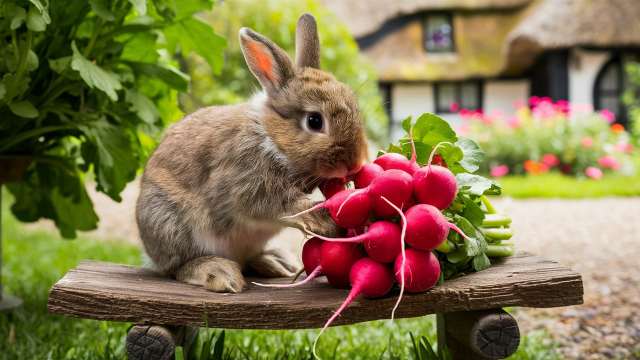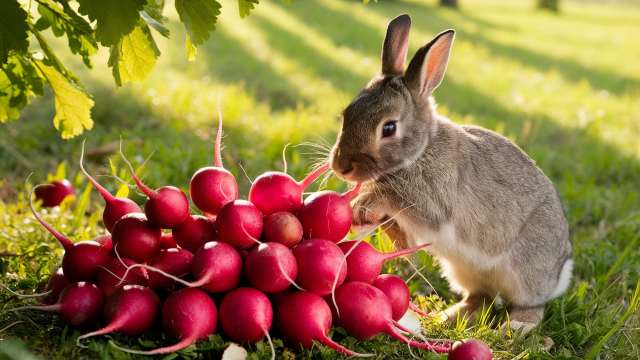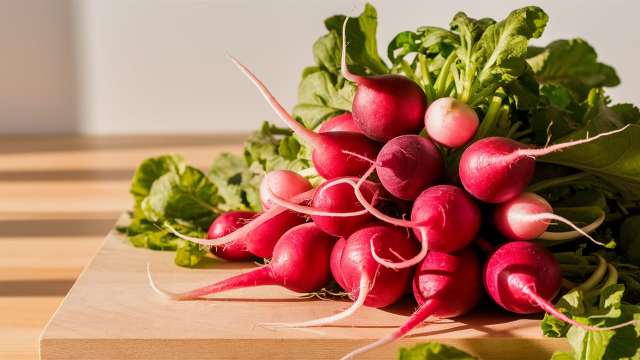Rabbits are known for their selective diets, making it crucial for pet owners to understand what they can safely eat. One common question is, “Can rabbits have radishes?” These crunchy vegetables may seem harmless, but their effects on a rabbit’s health can vary. Knowing how to incorporate radishes into your rabbit’s diet is essential for their well-being.
We’ll explore the nutritional value of radishes and their potential benefits and risks for rabbits. You’ll discover whether radishes should be a regular part of your pet’s meals or just an occasional treat.
Join us as we dive into the world of rabbit nutrition and uncover the truth about radishes. By the end, you’ll be equipped with the knowledge to make informed choices for your furry friend’s diet.
A Healthy Rabbit Diet With Radishes?
Radishes can be a fun addition to your rabbit’s diet, but they should be given in moderation. These crunchy veggies are low in calories and contain water, which helps keep your rabbit hydrated. However, they also have a strong flavour that some rabbits might not enjoy. Always introduce new foods slowly to see how your rabbit reacts.
When including radishes, remember they shouldn’t replace hay or fresh greens, which are essential for a rabbit’s health. A balanced diet is crucial for your rabbit to stay healthy and active. So, feel free to offer a small piece of radish as an occasional treat, but keep the focus on their primary diet of hay, vegetables, and a limited amount of pellets.
A Safe Substitute for Radishes
If radishes aren’t suitable for your rabbit, there are plenty of safer alternatives. Carrots, for example, offer a sweet crunch and are generally well-tolerated by rabbits. They provide vitamins and fibre that support digestive health. Just remember to cut them into small pieces to prevent choking.
Another great option is bell peppers. They are rich in vitamins A and C and can be a colourful addition to your rabbit’s diet. Ensure you remove any seeds and offer them in small, manageable pieces. Both carrots and bell peppers can make for nutritious, rabbit-friendly snacks.
Radish Facts: Nutrition, History, and Origins
Radishes are not only crunchy and refreshing but also packed with nutrients. They are low in calories and high in vitamins C and B6, which help support a healthy immune system. Radishes also contain antioxidants that fight free radicals and support overall health.
Radishes have a rich history dating back to ancient civilizations. Originating in Asia, they were cultivated by the Egyptians over 2,000 years ago. These versatile vegetables spread across the world, becoming a staple in many cultures due to their easy cultivation and health benefits.
Health Benefits of Radishes for Rabbits
Radishes can be a tasty treat for rabbits and offer some health benefits. They are low in calories, making them a good snack option for rabbits that need to maintain a healthy weight. Radishes also contain vitamin C, which can help support your rabbit’s immune system and overall health.
In addition to vitamins, radishes have a good amount of water, which helps keep rabbits hydrated. The crunchy texture can also promote dental health by encouraging chewing, which is important for keeping their teeth trimmed. Just remember to feed radishes in moderation to avoid any digestive issues!

Can Rabbits Eat Radishes as an Occasional Treat?
Yes, rabbits can eat radishes, but only as an occasional treat. Radishes are low in calories and high in water content, which can help keep your rabbit hydrated. However, they also contain compounds that can upset a rabbit’s stomach if eaten in large amounts. So, it’s best to offer radishes sparingly.
When giving radishes to your rabbit, start with a small piece and watch for any signs of digestive issues. If your rabbit enjoys it and shows no problems, you can occasionally include radishes in their diet. Just remember to prioritize hay and leafy greens as the main part of their meals.
Balancing Rabbit Nutrition
A balanced diet is essential for keeping your rabbit healthy. Rabbits need a mix of hay, fresh vegetables, and a small amount of pellets. Hay should make up the bulk of their diet, providing fibre for digestion. Fresh vegetables like leafy greens are also important, as they supply vitamins and minerals.
Table
ToggleRadishes in a Rabbit’s Diet
Radishes can be a fun treat for rabbits, but they shouldn’t be a main food source. These crunchy veggies are high in water and low in fibre, which can upset a rabbit’s stomach if given too often. It’s best to offer radishes in small amounts, mixing them with other vegetables to ensure a well-rounded diet. Always watch your rabbit’s reaction and adjust their diet accordingly.
How to Feed Radishes to Your Rabbits
When introducing radishes to your rabbit’s diet, start with small amounts. Wash the radishes thoroughly to remove any dirt or pesticides. Cut them into small pieces to make it easier for your rabbit to chew and digest. Always observe your rabbit’s reaction after feeding radishes for the first time. If they seem to enjoy it without any signs of discomfort, you can offer it occasionally.
Remember, radishes should only be a treat, not a main food source. Too many radishes can upset your rabbit’s stomach. Balance their diet with plenty of hay, fresh vegetables, and pellets. By following these tips, you can safely include radishes in your rabbit’s meals and keep them happy and healthy!
What Herbs Are Toxic to Rabbits?
Some herbs can be harmful to rabbits, so it’s important to know which ones to avoid. Herbs like basil, chives, and parsley are safe, but others, such as oregano and rosemary, can cause digestive issues or even poisoning. Always check before giving your rabbit any new herb.
If you’re unsure about an herb, it’s best to stick with safe options. When in doubt, consult a vet for advice on what to feed your rabbit. Keeping your pet safe is the most important thing!
How Much Radish Should I Feed My Rabbit?
When feeding radishes to your rabbit, moderation is key. You can offer a small slice or two as an occasional treat. This ensures your rabbit enjoys the crunchiness without overwhelming their digestive system. Remember, radishes have a strong flavour that some rabbits might not like at first.
It’s essential to monitor your rabbit’s reaction after introducing radishes. If they seem to enjoy it, you can gradually increase the amount, but keep it limited to a few times a week. Always provide plenty of hay and fresh veggies to ensure a balanced diet.
Types of Radishes to Feed Your Rabbit
When considering radishes for your rabbit, it’s important to know which types are safe. Here are a few options:
- Red Radishes: These are the most common type. They have a mild flavour and are crunchy.
- Daikon Radishes: These are larger and milder than red radishes. They can be a good choice for variety.
- Black Radishes: These have a stronger taste. They should be offered in small amounts due to their spiciness.
Always wash radishes thoroughly before feeding them to your rabbit. Start with small pieces to see how your pet reacts. Keep an eye on their health and adjust their diet accordingly!

Nutritional Value of Radishes for Rabbits
Radishes are low in calories and high in water, which can be refreshing for rabbits. They contain small amounts of vitamins like Vitamin C and minerals such as potassium, which are beneficial in moderation. However, radishes also have natural compounds that might be too harsh for rabbits if fed in large quantities.
Should Radishes Be a Regular Part of a Rabbit’s Diet?
While radishes can offer some nutritional benefits, they should only be an occasional treat. The strong flavours and compounds might upset a rabbit’s sensitive digestive system. It’s best to provide radishes in small amounts and ensure your rabbit’s diet is mainly made up of hay, fresh vegetables, and a balanced pellet mix.
How Radishes Digest in Rabbits
Radishes are crunchy and contain water, which can help with hydration. When rabbits eat radishes, their digestive system starts breaking them down in the stomach. The fibrous structure of the radish helps move food through the intestines, aiding in healthy digestion.
However, radishes are not as high in fibre as hay or leafy greens. If rabbits eat too many radishes, they might experience digestive upset. It’s important to give radishes as an occasional treat rather than a main food source to keep your rabbit’s tummy happy and healthy.
Do Rabbits Enjoy Radishes?
Rabbits are curious eaters, and they often enjoy trying new foods. Radishes can be a fun addition to their diet due to their crunchy texture and vibrant colour. Many rabbits are attracted to the taste of radishes, especially when fresh and crisp. However, not all rabbits will enjoy them, as individual preferences can vary.
Offering Radishes as Treats
While rabbits might enjoy radishes, they should only be given in moderation. Radishes contain certain compounds that can upset a rabbit’s stomach if eaten too much. It’s best to introduce radishes slowly and see how your rabbit reacts. Always ensure they have a balanced diet of hay, fresh vegetables, and pellets for optimal health.
Choose the Right Plants
To create a rabbit-friendly garden, start by choosing safe and healthy plants. Rabbits love leafy greens, herbs, and certain flowers. Some great options include clover, parsley, basil, and dandelions. Make sure to avoid toxic plants like foxglove or azaleas. Planting a variety of rabbit-friendly plants ensures they have plenty of tasty options to munch on.
Create a Safe Space
Next, design a safe space for your rabbits to explore. Use fencing to keep them secure and prevent them from wandering off. Add hiding spots, such as shrubs or garden decor, where they can feel safe. Providing a shady area is also important, as rabbits can overheat in direct sunlight. Your garden can become a perfect playground for your furry friends with the right plants and a safe environment!

Radish-Based At-Home Rabbit Treats
Making radish-based treats at home for your rabbit can be a fun and healthy option. You can slice radishes into small pieces or create a mash. Mix them with other safe veggies like carrots or leafy greens for a tasty snack. Just remember to introduce new foods gradually to avoid any tummy troubles.
These treats should be given in moderation. While radishes are low in calories, they can still be too strong for some bunnies. Always keep an eye on your rabbit after trying a new treat. If they enjoy radish treats, it can add variety to their diet and keep them excited about mealtime!
Conclusion
Radishes can be offered to rabbits in moderation, but they should not be a staple in their diet. Understanding the nutritional impact and monitoring your rabbit’s reaction to new foods is key. By making informed choices, you can ensure your furry friend enjoys a balanced diet that keeps them healthy and happy. Always consult a vet if you’re unsure about any new treats!
FAQs
-
Can rabbits eat radishes every day?
Radishes should be given in moderation, not as a daily staple.
-
What part of the radish can rabbits eat?
Rabbits can eat both the radish root and the leafy greens.
-
Are radishes safe for baby rabbits?
It’s best to avoid radishes for baby rabbits until they are older and accustomed to various veggies.
-
What should I do if my rabbit doesn’t like radishes?
If your rabbit doesn’t like radishes, try offering other safe vegetables instead.
-
Can radishes cause digestive issues in rabbits?
Yes, some rabbits may experience digestive upset if they eat too many radishes. Always introduce new foods slowly.

Admin – Pet Expert shares valuable tips on pet care, nutrition, and health, offering practical advice to help your furry friends thrive.











